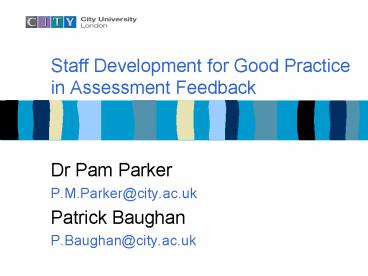Staff Development for Good Practice in Assessment Feedback - PowerPoint PPT Presentation
1 / 17
Title:
Staff Development for Good Practice in Assessment Feedback
Description:
Explore strategies that facilitate lecturer development of feedback ... 'The student is not fully conversant with all the literature available.' ( Student 13) ... – PowerPoint PPT presentation
Number of Views:22
Avg rating:3.0/5.0
Title: Staff Development for Good Practice in Assessment Feedback
1
Staff Development for Good Practice in Assessment
Feedback
- Dr Pam Parker
- P.M.Parker_at_city.ac.uk
- Patrick Baughan
- P.Baughan_at_city.ac.uk
2
Session Outcomes
- Identify the important issues related to
assessment feedback - Explore strategies that facilitate lecturer
development of feedback - Examine the outcomes of a small scale study of
staff development with lecturers.
3
Reasons for the Study
- 2006 2007 National Student Survey results
- Examination of External Examiner Reports and
Annual Programme Evaluations - Issues arising in the literature
- Shared interest in the topic.
4
Students concerns about feedback
- Lacks specific comments, is general and vague
- No guidance for future improvement (Duncan 2007,
Higgins, Hartley Skelton 2002, Hounsell et al
2008, Stefani 1998)
- Variability and credibility of feedback (Higgins
et al 2002 Poulos Mahony 2008) - Feedback written for a third party and not the
student (Duncan 2007).
5
Staff Development Opportunity
- We wanted to find out when lecturers were given
staff development in this area, would they apply
this to practice? - Group comprised of a cohort of staff students
who undertook Module 1 of the MA Academic
Practice programme the Teaching, Learning and
Assessment module - One full day of the module is focused on
assessment and feedback issues.
6
Student Information
- Range of backgrounds students based across seven
- Schools of the University
- Range of experience students had between 1 month
- and 2 years of teaching experience
- All students agreed to take part in the study
- 16 students in total for the first phase of the
project.
7
Study Approach
- Evaluation approach used
- Data collected through documentation completed by
the students - Qualitative data analysis, linked to themes in
the literature - All subjects assured anonymity and
confidentiality.
8
Data Collection
- 3000 word essay focused on pedagogic challenges
they face and how they have or will manage these - In addition, all students were asked to self
assess - provide a mark for each of the
criteria - - provide feedback
- - provide an overall mark
- We then marked the essay and provided feedback on
their self assessment mark and comments.
9
Assessment Criteria
- Use of Literature (30)
- Interface between theory and professional
practice (30) - Reflection (20)
- Clarity of reasoning and style (10)
- Organisation and presentation (10).
10
Results - Grades
- We compared the students marks and comments with
- our own for the 16 students
- Nine (56) were within 5 of our grade
- Two (13) were within 6 10 of ours but had
given a lower grade - One was within 6 10 of ours but had given a
higher grade - Three (19) were within 11 15 of ours but had
given a lower grade - One was 16 20 outside our grade and this was
higher.
11
Results Specific and focused on the five
criteria
- Three (19) students wrote their comments
unrelated to the criteria - Five (31) wrote some comments related to
criteria but not all - Eight (50) wrote comments related to all
criteria.
12
Results positive comments and areas to develop
- One student made no positive comments
- 15 (94) students noted some positive comments,
although only four students provided a positive
comment for all of the criteria - In terms of areas to develop, none of the
students provided comments for all the criteria
despite not one student gaining full marks in a
section - The comments that were made in relation to areas
to develop were noted to be very general without
specific advice on how to improve.
13
Results examples of comments for areas to develop
- Use of Literature 30
- You might have presented more evidence from the
systematic review of e-learning (Student 3) - although more reference to peer-reviewed
educational research journal articles could have
been made. (Student 11) - The student is not fully conversant with all the
literature available. (Student 13).
14
Results comments continued
- Interface between theory and professional
practice 30 - could be strengthened even further with a few
more links with theory (Student 4) - More linking of the theory and practice would
be helpful, as would further reference to the UK
higher education climate. (Student 9) - While I have made connections between practice
and theory, I think that this area could have
been drawn out further. (Student 12).
15
Results Who was feedback written for
- Two (12) students wrote the feedback directed to
a student - Six (38) wrote the feedback as a self assessment
- Eight (50) wrote the feedback to a third person.
16
Results Volume of feedback
- One (6) student wrote extensive feedback
- Four (25) further students provided between 3
6 lines per criteria - Eleven (69) students provided either limited
general feedback or less than 3 lines per
criteria.
17
Conclusion
- What are we going to do with the results?
- Sharing results with the students
- Future phases of the project.































